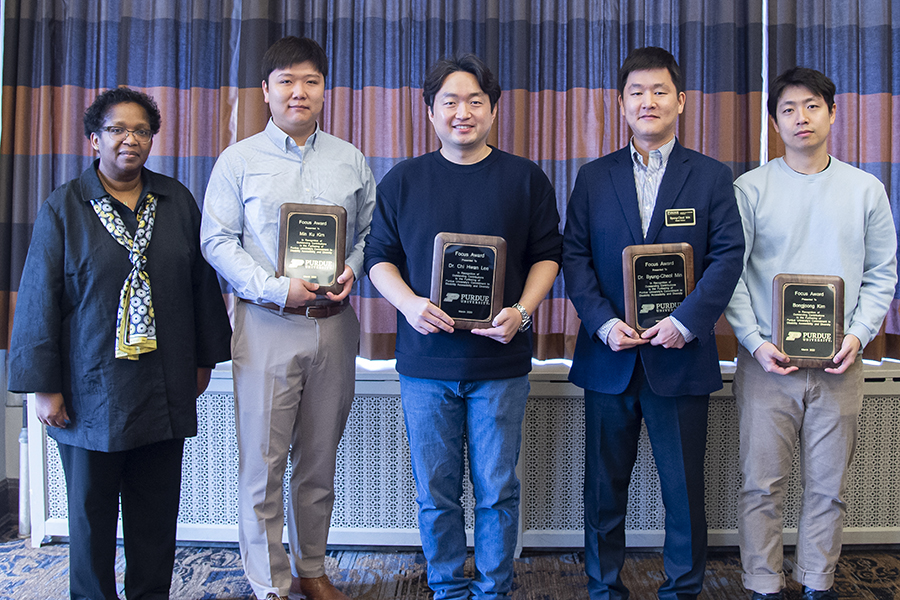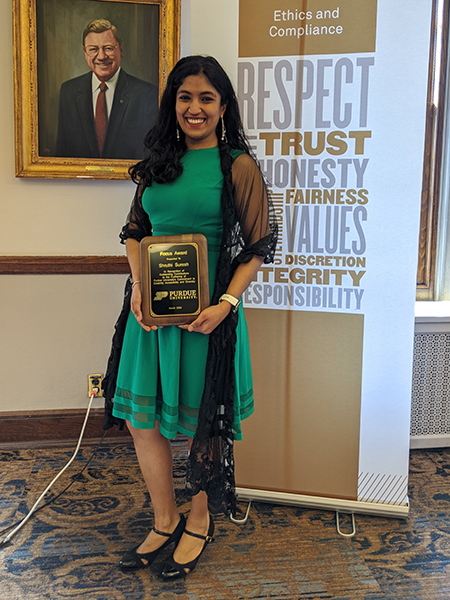Two Focus Awards honor outstanding contributions in disability accessibility and disability diversity
Chi Hwan Lee, assistant professor of biomedical and mechanical engineering, and his team, won the Focus Award in the organization category for their development of the e-glove technology. PhD candidate Shruthi Suresh won in the student category for her work in autonomic dysreflexia, the WristSense project, EPICS, for mentoring of an undergraduate student with autism, and for her startup, HaptImage. Suresh shared the award with HaptImage co-founder Ting Zhang.

Focus Award for Organization – The developers of the e-glove
The team of developers for the e-glove were selected to receive the organization award for its commitment and dedication to accessibility and disability specifically through the development of the e-glove technology.
People with hand amputations experience difficult daily challenges that often lead to lifelong use of prosthetic hands and services. The recipients of the Focus Award for Organization developed an electronic glove, or e-glove, that can be worn over a prosthetic hand to provide humanlike softness, warmth, appearance and sensory perception, such as pressure, temperature, and hydration. They collaborated with each other, and others around the country, to work on this new, affordable technology.
The e-glove uses thin, flexible electronic sensors and miniaturized silicon-based circuit chips. The e-glove is connected to a specially designed wristwatch, allowing for real-time display of sensory data and remote transmission to the user for post-data processing.
The team hopes that the appearance and capabilities of the e-glove will improve the well-being of prosthetic hand users by allowing them to feel more comfortable in social contexts. The e-glove is also cost-effective and able to be manufactured in high volume, making it a more affordable option than other technologies.
In addition to Lee, the team members working on the e-glove project include Byung-Cheol Min, assistant professor of computer and information technology and a founder and director of the SMART Lab at Purdue, and graduate researchers Yeonsoo Park and Min Ku Kim (Biomedical Engineering) and Bongjoong Kim (Mechanical Engineering).

Focus Award for Students – Shruthi Suresh and Ting Zhang
Shruthi Suresh is a PhD candidate at the Weldon School of Biomedical Engineering. She has worked extensively with individuals with a wide variety of disabilities, including individuals with mobility impairments, individuals with visual impairments and individuals with cognitive disabilities.
Suresh’s thesis work focuses on detecting and predicting the onset of autonomic dysreflexia (AD) in persons with spinal cord injuries. AD can occur spontaneously due to various triggers and often causes debilitating symptoms including headaches and acute anxiety. If poorly managed, AD can lead to death. The system developed uses machine learning and sensor data to allow the detection of AD and provide alerts to caregivers and health care professionals upon onset of symptoms. During user testing, a participant thanked Suresh for the development of the tool, as its detection abilities allowed them to make the necessary adjustments thereby preventing the escalation of symptoms. This system will allow continuous oversight of the individuals and enable individuals with SCI to perform daily activities without feeling helpless if they spontaneous developed AD during their daily routine.
Suresh has also worked on projects to improve the quality of life of individuals with mobility impairments. One of the projects is WristSense, a flexible, active, 3D printed wrist orthotic which can recognize gestures to perform activities of daily life. This is particularly helpful for individuals with weak wrists who require splints or orthotics. These passive instruments can be converted into active tools using the power of machine learning and the internet of things. Through the WristSense, a user can get a customized, unique orthotic which allows control of daily objects such as a laser pointer, a garage door or even their PowerPoint slides.
In addition, she has mentored and advised students in EPICS developing tools for individuals with disabilities. These teams have worked on developing projects for students with a wide range of disabilities. One of these projects, WilliARM developed a prosthetic arm for a 5-year-old boy born without his right arm; while another project works with the Indiana School for the Blind and Visually Impaired on developing a lightweight, iPad-based Magnifier for the students enrolled in the school. Other projects include developing a ball for the Indianapolis Beep Baseball Association as well as development of a fishing rod for a 6-year-old boy with Hypochondroplasia (short arms). In all these projects, Suresh guided the students with help from the Disability Resources Center to gain a better understanding of the needs of the project partners. She helped them understand that individuals with disabilities should be treated equally and spoken to with equal amounts of respect as well as using people first language.
Suresh also mentors an undergraduate student who is on the autism spectrum. She uses her experience from volunteering at an autism center in Jakarta, Indonesia, during high school, to create a conducive environment for her student. Suresh has made accommodations to adjust the research schedule to her student’s testing schedule and is sensitive to any environmental triggers which may prevent her student from performing to the best of her abilities. She also ensures that she is communicating with her to adjust the work environment accordingly.
Finally, Suresh is recognized along with Ting Zhang for co-founding a start-up company, HaptImage, to help the blind. The mission of HaptImage is to improve the education for people who are blind, particularly in the STEM fields where understanding images that represent scientific data is particularly abundant and instrumental in pursuing a STEM career.
